Chicago's record-shattering run of above-normal temperatures ended yesterday:
The abnormal, all-too-often record warmth, couldn't continue indefinitely. For 26 consecutive days, Chicagoans were treated to temperature levels which would have been at home in June and July. They were without precedent in March and early April.
The impact of that warmth continues, even in the midst of noticeably cooler air here. And while Easter weekend temperatures are expected to rebound to the 60s, an even cooler air mass seems determined to settle southward over the eastern half of the country next week.
April's opening 5-days continue to run 3°C warmer than the same period a year ago. The results of the abnormal warmth have been tangible. Vegetation in and around Chicago has bloomed 4 to 6 weeks early, a trend which has already spawned an extremely challenging pollen-season through which many continue to suffer.
Thursday marked the first day in 27 in which temperatures finished "below normal".
Next week it's supposed to be "seasonal," which could include a freeze.
The opening days of April have seemed a lot cooler than all but one or two days in March, but as it turns out, we're still above normal:
Despite the chilly feel to the air in recent days, the books closed on a 26th consecutive above normal average daytime temperature here Wednesday. The day finished 4.4°C above normal with a high of 14.4°C.
Any clarity in the forecast for the summer, though? The Climate Prediction Center still sees only a 33% chance of above-normal temperatures through the middle of June, as the La Niña that gave us the warmest March ever winds down to a neutral state over the next couple of weeks.
If we have the warmest spring followed by a cooler-than-normal summer, there will be much rejoicing at The Daily Parker.
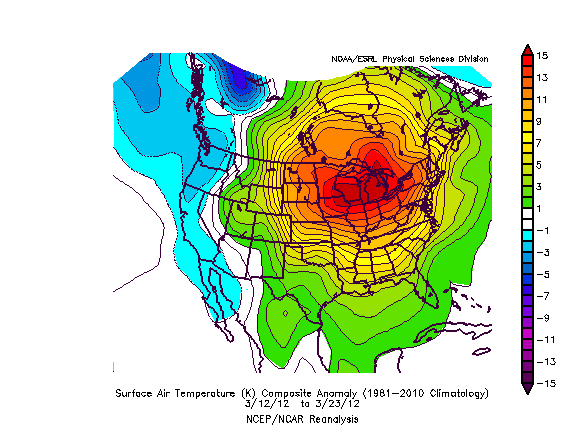 Illinois State Climatologist Jim Angel rounded up some explanations of last month's record heat. Here's the NWS Chicago office:
Illinois State Climatologist Jim Angel rounded up some explanations of last month's record heat. Here's the NWS Chicago office:
The 2.7°C difference between the average temperature for March 2012 at Chicago-O'Hare and the previous record for warmest March is by far the largest difference between 1st and 2nd place between record warm or cold months in Chicago. The second largest difference between 1st and 2nd place is the 1.7°C separating the average temperature of January 1880 (4.3°C) and January 1933 (2.6°C) for the warmest Januarys on record in Chicago.
The 8.67°C departure from normal for March 2012 is the 3rd largest departure from the 1981-2010 normal for any month in Chicago. The only months that had higher departures from normal were January 1877, which with an average temperature of 4.3°C, was 8.9°C above the 1981-2010 average January temperature, and December 1877, which with an average temperature of 6.3°C, was 8.72°C above the 1981-2010 average December temperature.
For a more technical discussion, check out NOAA's analysis, which concludes:
A black swan most probably was observed in March 2012 (lest we forget 1910). Gifted thereby to a wonderful late winter of unprecedented balmy weather, we also now know that all swans are not white. The event reminds us that there is no reason to believe that the hottest, "meteorological maddest" March observed in a mere century of observations is the hottest possible. But this isn't to push all the blame upon randomness. Our current estimate of the impact of GHG forcing is that it likely contributed on the order of 5% to 10% of the magnitude of the heat wave during 12-23 March. And the probability of heatwaves is growing as GHG-induced warming continues to progress. But there is always the randomness.
April, so far, has been bog-standard normal.
Yesterday, the forecast for tomorrow's Chicago weather called for—no April Fool's joke here—32°C. Just a few hours ago the forecast had changed to a more comfortable 25°C, which is about as close to ideal as I can imagine. Just now, though, the National Weather Service says to expect nothing better than 13°C. Aw, come on.
On the other hand, Chicago had its warmest March in history, at 11.9°C, which beat the previous record (set in both 1945 and 1910) of 9.2°C. So, you know, the weather hasn't been that awful lately.
Via reader MG, a beautiful visualization of the wind on a map. A static example, from Tuesday:
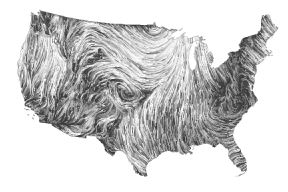
Illinois State Climatologist Jim Angel has crunched the numbers, and thinks (contra my own fears) that we might not get melted into little puddles of goo this summer after all:
Historically, a warm March has been followed by a colder-than-normal April on average (first map). That’s true not just in Illinois but across the U.S. On the other hand, precipitation for those same April periods was a mixed bag in Illinois (second map). Most of the state was near-normal while west-central Illinois was slightly wetter-than-normal.
I considered the entire May-August period in one set of maps. One popular question I get is “Does this warm weather now mean that we will get a hot summer?” At least historically, the growing season following a warm March does not show a pattern of above-normal temperatures. On average, they have been remarkably mild in temperature.
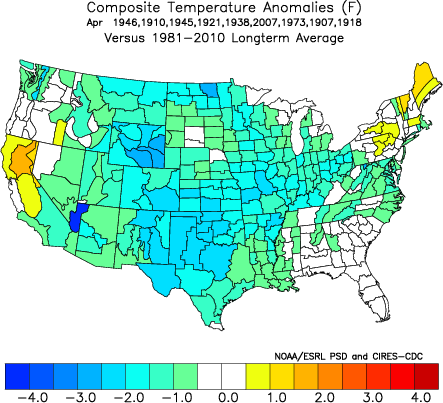
I still worry that the really warm lake temperatures and the lack of snow cover during the winter, followed by an unprecedented 8 days of 27°C weather this month (not to mention the hottest March in recorded history), can't help but yield a brutal summer.
Angel has the data, though. I tend to trust data. I should be reassured...but I'm also from Chicago.
And now Chicago is back on track for a record March. We woke up this morning to the gray
5°C weather we had all day yesterday, but right now O'Hare is up to 23°C—a normal temperature for Memorial Day.
Warmest March ever. Warmest January to March ever. Let's see if we get the warmest spring ever...
The hits just keep on coming as Chicago hits yet another new heat record (28°C):
In Chicago...prior to this year there had only been 10 days in March with highs in the 80s [Fahrenheit, 26.7°C], which means on average, Chicago only sees an 80 degree high in March once about every 14 years. Already this month, there have been seven [now eight—db] days at or above 80. Including the [eight] days at or above 80 this March, there have now been a total of [18] March days at or above 80 in Chicago. This means about one third of one percent of all March days have been in the 80s in Chicago.
The last time Chicago saw an 80 degree temperature during the month of March (prior to this year) was over 22 years ago back on March 12, 1990, when the high temperature was 81.
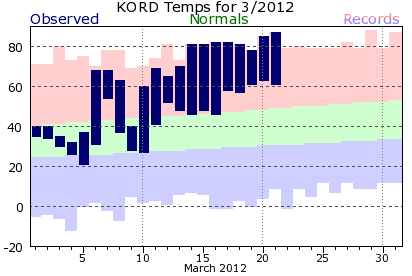
Here's the updated table:
| Date |
Old record |
New record |
| March 14 |
25.0°C, 1995 |
27.2°C |
| March 15 |
23.3°C, 1995 |
27.2°C |
| March 16 |
25.6°C, 1945 |
27.8°C |
| March 17 |
23.3°C, 1894, 2009 |
27.8°C |
| March 18 |
23.3°C, 1903, 1918, 1969 |
27.2°C |
| March 19 |
25.6°C, 1921 |
25.6°C (tie) |
| March 20 |
24.3°C, 1921 |
29.3°C |
| March 21 |
25.0°C, 1938 |
30.6°C |
| March 22 |
26.3°C, 1938 |
27.8°C as of 1:51pm |
No, no global warming here, you can go about your business...
Researchers at Amundsen-Scott South Pole Station have been watching the sun set for weeks. At the poles, the sun traces an excruciatingly slow corkscrew between equinoxes, first spiraling up to a point 23° above the horizon (only about as high as the sun gets in Chicago around 10am on December 21st) on the solstice, then slowly spiraling back down to the horizon over the next three months.
In about an hour from now, the last limb of the sun will slip below the south polar horizon, the twilight gradually fading for another three weeks. The sun won't appear again until September 20th.
Fourteen people will spend the next five months at Amundsen-Scott, with no possibility of leaving until the end of August.
First, just a nod to the eighth record temperature in a row that Chicago just set. Tom Skilling's blog entry this morning maps out the carnage, including record pollen levels, the hottest lake temperature readings ever for this time of year, and a forecast for above-average temperatures going into April. Let me tell you how thrilled I am that we've skipped spring and gone straight to July. As my servers start to melt and I lose sleep because the house is too hot, I find myself wishing for autumn the day after the March equinox.
It's not that warm in Paris. Here's another view of the Pont Neuf, which I like a little better than the one I posted Sunday:
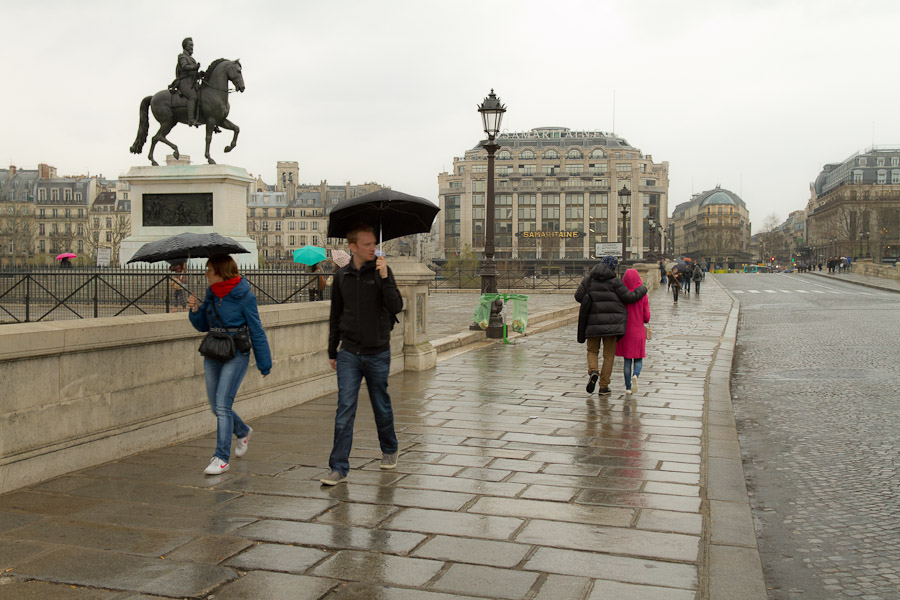
And thank you, Eurostar, for making this all possible:
